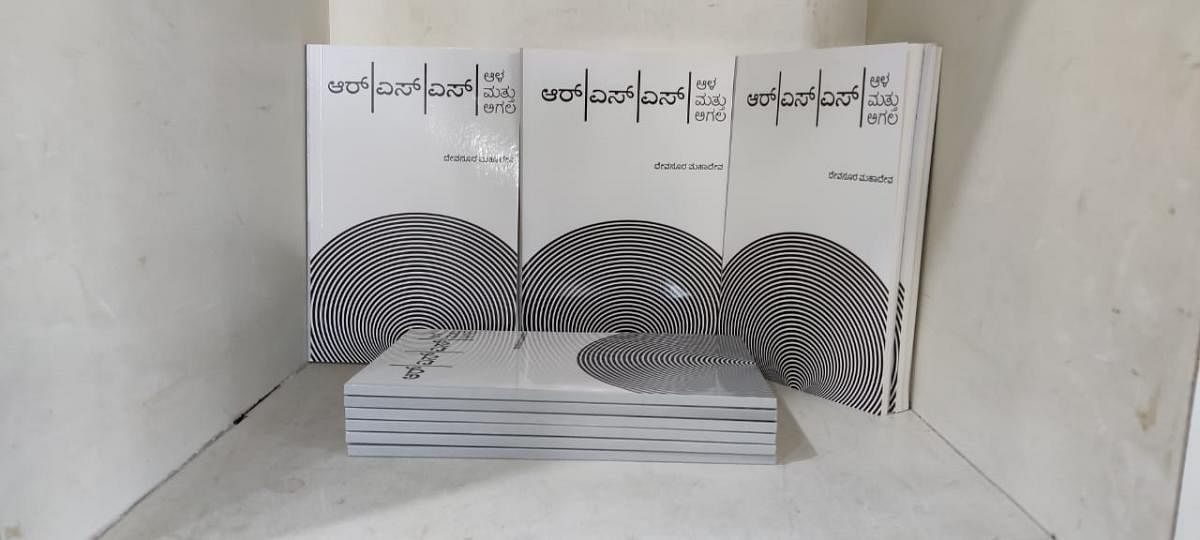
A new Kannada book critical of the Rashtriya Swayamsevak Sangh (RSS) is flying off the shelves in Bengaluru even before its formal launch.
A 72-pager, ‘RSS: Aala Mattu Agala’ (‘The Depth and Breadth of RSS’) hit bookstores on Saturday. One shop sold its entire stock of 500 copies by Sunday. Others are waiting to get their hands on the book as publishers have almost run out of stock.
Written by Devanur Mahadeva, one of Karnataka’s foremost writers, it quotes from the writings from Golwalkar, Savarkar and Hegdewar — all of whom shaped the Hindu right-wing organisation’s ideology — to show how they justify the caste system and oppose the Constitution and federalism.
Mahadeva dwells on the wave of majoritarianism, and the book shows how it goes against Constitutional values of equality and liberty, says activist and freelance journalist Shivasundar.
He says it is not hard to see why Mahadeva’s book is doing well: “He has written it at the ascendancy of right-wing communalism and Hindutva and the fountainhead of this political ideology is RSS.”
Aakruti Books in Rajajinagar sold all 500 copies in a day. Owner Guruprasad D N says he hasn’t seen such an enthusiastic response ever to a non-fiction Kannada book. “We didn’t take pre-orders. We did not make (prior) announcements. The sales happened spontaneously. An engineer bought 10 copies so he could distribute them to his friends and family. Lecturers picked up multiple copies for their students,” he says.
This could be because there are not many books scrutinising the RSS in Kannada, with a notable exception being ‘RSS Antharanga’ by A K Subbaiah, the first president of the BJP in Karnataka, says Guruprasad. “Or perhaps this reflects the public anger against current politics,” he remarks, referring to the textbook revision in BJP-ruled Karnataka cited in the book.
‘RSS: Aala Mattu Agala’ has six publishers who printed 9,000 copies together from a PDF manuscript Mahadeva shared. Gauri Media Trust, named after the slain journalist Gauri Lankesh, is one of them and is based in Bengaluru. It has sold all copies.
Its associate editor Mutturaju says, “We knew the book would do well because it was coming at a time when communal tension is high in Karnataka and Congress leader Siddaramaiah called RSS an Aryan organisation.” Even Manava Bandhutva Vedike, an NGO active across Karnataka, and Abhiruchi Prakashana from Mysuru have run out of their first print of 1,000 and 2,000 copies respectively, we learnt.
Navakarnataka Publications, which runs a bookstore in Gandhinagar, has sold about 850 copies from the initial stock of 1,000. H Puttappa, manager, says nonfiction works have been doing well in general, a recent bestseller being a book on reservation by former High Court judge H N Nagamohan Das, ‘Misalati Bhrame Mattu Vastava’.
Jeerunde Pusthaka, an online store, sold 600 copies in three days and is left with another 100. A majority of orders came from northern Karnataka districts, Tamil Nadu and Andhra Pradesh. Owner Dhananjaya N attributes the rush to Mahadeva’s writing style that is rich in metaphor and folk idiom.
Mahadeva is also seen as a “figure of unification” and the book may be a rallying point for resistance against the BJP’s policies, Shivasundar says. In 2015, Mahadeva was among the many authors who returned their Padma and Central Sahitya Akademi awards. The book is priced at Rs 40.
One book, six publishers: Devanur on a new model
‘RSS: Aala Mattu Agala’ is an experiment in decentralised publishing, well-known writer Devanur Mahadeva told Metrolife on Tuesday.
Did you expect such an enthusiastic response to the book?
No, not on this scale. We had been planning a decentralised publishing movement. For the first edition, six publishers brought out 9,000 copies of this book. Gauri Media Trust published 2,000 copies, and the entire lot was sold out in just three days. This was unexpected. With demand growing, they are now publishing 5,000 copies. That edition will be out tomorrow (Wednesday). Other publishers are going in for 3,000 and 5,000 copies. My personal view: Isn’t it possible for each taluk to print 1,000 or 2,000 copies and sell them there? Chikkanayakanahalli and Tiptur taluks have already done it.
How long did it take to write the book?
It took me three months to read up and prepare for it. The writing took 15 days. Making the writing simple and straightforward took another month. Why are things this way? I had to confront questions with no answers. I tried to understand. I addressed young readers and explained my thoughts.